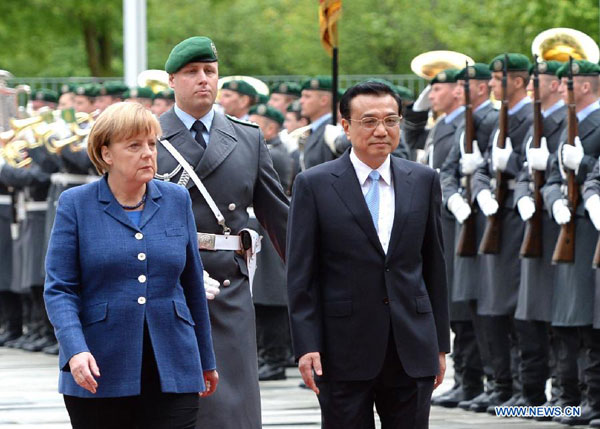Li's German tour promotes strategic partnership, co-op
 0 Comment(s)
0 Comment(s) Print
Print E-mail Xinhua, May 28, 2013
E-mail Xinhua, May 28, 2013
Chinese Premier Li Keqiang's first official visit to Germany, which was wrapped up Monday, will consolidate bilateral strategic partnership and boost the cooperation between China and Europe at large.
|
|
| Chinese Premier Li Keqiang (front R) attends a welcoming ceremony held by German Chancellor Angela Merkel (L) in Berlin, capital of German, May 26, 2013. [Ma Zhancheng/Xinhua] |
During the tight schedule of the 3-day visit, the premier made extensive contacts with German political and business leaders, launched "the Year of Languages" program with German Chancellor Angela Merkel, and signed a series of documents regarding cooperation in the manufacturing sector, investment, urbanization and finance.
Analysts said China-Germany relations, which are at the forefront of China's relations with Western powers and play a leading role in China-EU ties, have been further cemented during Li's trip.
To strengthen?strategic communication
During the trip, the premier said China is ready to boost dialogue and exchanges with Germany on the basis of mutual respect and equality, promote mutual understanding and trust, and cope with challenges hand in hand.
According to a joint statement issued Sunday, China and Germany agreed to keep broadening their various cooperative mechanisms, and a new round of intergovernmental consultations will be held in Germany in 2014.
Li said the two countries should strengthen strategic communication by keeping up the current mechanisms of annual leaders' meetings and intergovernmental consultations, and enhance communication and coordination on regional and international affairs.
Merkel said Germany is ready to deepen its cooperation and strengthen exchanges and mutual-learning with China to jointly push forward the development of their strategic partnership.
Gu Xuewu, director of the International Relations Center for Global Studies at Bonn University, said the two countries have fostered a high level of mutual trust that is rarely seen between big powers, and the China-Germany intergovernmental consultation mechanism is a natural result of their mutual political trust.
High-level contacts and consultations help lift political ties and lower the risk of tense disputes, said Cora Jungbluth, a project manager at Germany's Bertelsmann Foundation, noting that there are no such high-level consultation mechanisms between China and other Western countries.
To promote pragmatic cooperation
During Li's talks with Merkel, he said China is ready to work with Germany to further promote their multi-layered and wide-ranging cooperation.
According to the joint statement, the two sides believe that the synchronous and coordinated development of industrialization, informatization and urbanization in China will provide new opportunities for development of China-Germany and China-EU ties and inject fresh impetus into the world economy.
They decided to implement their urbanization partnership, further enhance the bilateral cooperation in such areas as agriculture, forestry, grain, consumer protection, food safety, eco-labelling and electric cars.
To promote cooperation in investment, China announced the launch of a Chinese chamber of commerce in Germany, while Germany welcomed Chinese enterprises to invest and create jobs in Germany in the spirit of mutual benefits.
China and Germany pledged to strengthen extensive economic cooperation on the basis of equality and mutual benefit, and each side would provide national treatment for the other's companies based on its soil.
For years, China's trade with Germany has constituted nearly one third of its total trade with the EU as a whole. Bilateral trade reached 161 billion U.S. dollars in 2012, which is 580 times of the figure in 1972, said Chinese Ambassador to Germany Shi Mingde.
Strong investment and trade ties with China have created and retained jobs in Germany and bolstered Germany's status as EU's leading economy, said Benno Bunse, CEO of Germany Trade and Invest.
"I believe the smooth and fruitful Germany-China cooperation would inspire other EU countries in their relations with China," he said.
To advance China-EU ties
"Germany is the first EU country I visit since taking office as Chinese premier," Li said. "That shows the Chinese new leadership highly values China's relations with the EU."
China always sees Europe from a strategic point of view and firmly supports European integration and the EU's efforts to tackle the debt crisis and maintain economic stability, the Chinese premier said.
China-EU relations face new opportunities as this year marks the 10th anniversary of the establishment of the China-EU comprehensive strategic partnership, Li noted.
He called on both sides to grasp the overall situation and the mainstream of their cooperation and properly handle their differences in order to make new strides in China-EU ties.
Both China and Germany voiced opposition to trade protectionism and the EU's trade actions against Chinese solar panels and mobile telecommunications equipments.
China hopes to properly settle the disputes through dialogue and consultation, instead of engaging in a trade war, Li said.
Merkel said Germany supports stronger EU-China cooperation, adding that Germany believes the EU and China should use dialogue and consultation to resolve the problems in their cooperation and make efforts to expand trade while avoiding frictions, so as to achieve mutual benefits and win-win results.
Germany was the last leg of Li's first overseas trip since he took office in March, which has already taken him to India, Pakistan and Switzerland.






